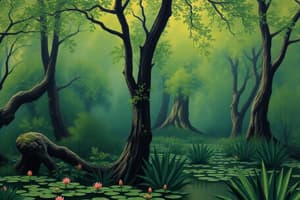Podcast
Questions and Answers
Ecology is the study of interactions between which of the following?
Ecology is the study of interactions between which of the following?
Ecology is the same as environmental science.
Ecology is the same as environmental science.
False (B)
What are the three main subgroups of organismal ecology?
What are the three main subgroups of organismal ecology?
Behavioral ecology, Physiological ecology, Evolutionary ecology
The study of how populations grow and interact with other species is called ______ ecology.
The study of how populations grow and interact with other species is called ______ ecology.
Signup and view all the answers
Match the following ecological scales with their corresponding focus:
Match the following ecological scales with their corresponding focus:
Signup and view all the answers
What does the acronym HIPPO stand for in the context of human-induced threats to the environment?
What does the acronym HIPPO stand for in the context of human-induced threats to the environment?
Signup and view all the answers
The Global Change Research Act of 1990 defines global change as changes only in the Earth's climate.
The Global Change Research Act of 1990 defines global change as changes only in the Earth's climate.
Signup and view all the answers
What is the primary impact of habitat destruction on biodiversity?
What is the primary impact of habitat destruction on biodiversity?
Signup and view all the answers
Invasive species can cause severe harm by ______ native species, outcompeting them for resources, parasitizing them, or hybridizing with them.
Invasive species can cause severe harm by ______ native species, outcompeting them for resources, parasitizing them, or hybridizing with them.
Signup and view all the answers
Match the following examples of pollutants to their respective categories:
Match the following examples of pollutants to their respective categories:
Signup and view all the answers
Which of the following is NOT a direct exploitation of natural resources?
Which of the following is NOT a direct exploitation of natural resources?
Signup and view all the answers
Biomagnification refers to the process of pollutants becoming increasingly concentrated in organisms at higher trophic levels.
Biomagnification refers to the process of pollutants becoming increasingly concentrated in organisms at higher trophic levels.
Signup and view all the answers
What is the term for the process by which pollutants interfere with organisms' biochemical processes?
What is the term for the process by which pollutants interfere with organisms' biochemical processes?
Signup and view all the answers
Study Notes
Ecology: The Study of Interactions
- Ecology is the study of interactions among organisms and between organisms and their environments.
- It examines biotic (living) and abiotic (non-living) interactions.
- Ecology is distinct from environmental science, though they overlap in some topics.
History & Etymology of Ecology
- "Eco-" derives from the Greek word for "house", referring to habitat or environment.
- "-Nom" refers to knowledge.
- "-Log" represents study
Scales of Ecological Study
- Organismal Ecology: Investigates how individual adaptations and behaviors affect survival and reproduction. Sub-categories include behavioral, physiological, and evolutionary ecology.
- Population Ecology: Studies population growth, interactions with other species (competition, predation, etc.), and factors influencing density.
- Community Ecology: Focuses on species richness, community function, and succession after disturbances (e.g., fires, hurricanes). This includes monitoring surveys.
- Ecosystem Ecology: Describes the flow of energy and nutrients through communities, encompassing living (biotic) and non-living (abiotic) components.
Key Concepts in Ecology
- Ecosystem: A community of living organisms interacting with their physical environment.
- Human-Induced Threats (HIPPO): A framework conceptualizing the major drivers of biodiversity loss: Habitat Destruction, Invasive Species, Pollution, Population (human), Overharvesting.
- Global Change: Environmental alterations capable of impacting Earth's ability to sustain life. Includes threats like habitat destruction, invasive species introduction, overexploitation, and pollution.
Types of Ecological Threats and Impacts
- Habitat Destruction: Reduces species abundance and genetic diversity, altering wildlife behavior and community composition.
- Introduction of Invasive Species: A significant threat; over 4500 invasive species in the US, at least 15% causing severe harm.
- Pollution: A factor at local and global scales, impacting through toxic chemicals, greenhouse gases, and biomagnification. Examples include DDT pollution and oil spills (Deep Horizon, Gulf of Mexico).
- Biomagnification: The increase in concentration of pollutants through trophic levels in food chains. Chemicals like chlorinated hydrocarbons (e.g., DDT) and PCBs accumulate in organisms, causing various effects like thinning eggshells in birds and endocrine disruption.
- Direct Exploitation: Activities such as hunting, harvesting, and collecting can negatively impact populations.
- Pollutants' Effects: Interfere with organisms' biochemical processes, causing varied impacts - from immediate death to long-term health effects on future generations. The impact depends on the pollutant's toxicity, quantity, duration, and the organism's sensitivity.
Studying That Suits You
Use AI to generate personalized quizzes and flashcards to suit your learning preferences.
Description
Test your knowledge on the fundamental concepts of ecology. From interactions between organisms to the differences between ecology and environmental science, this quiz covers a range of topics. Challenge your understanding of organismal ecology and ecological scales!




